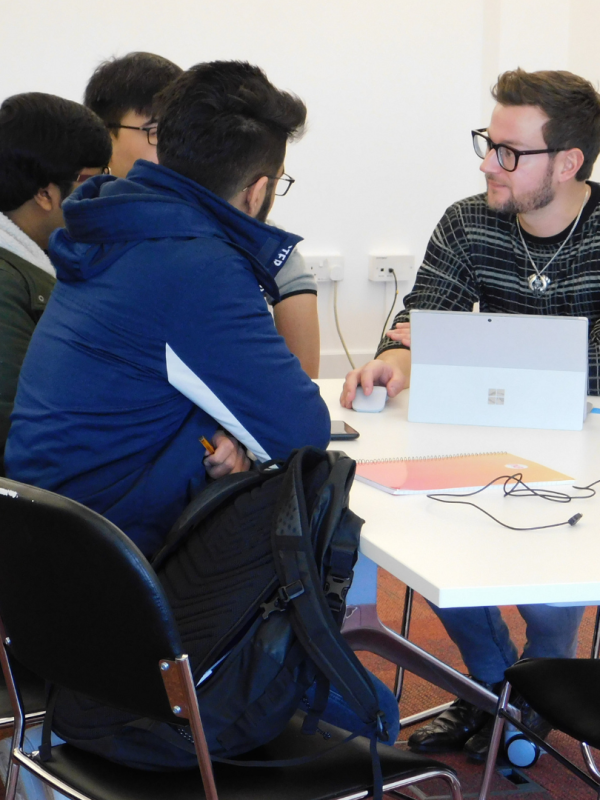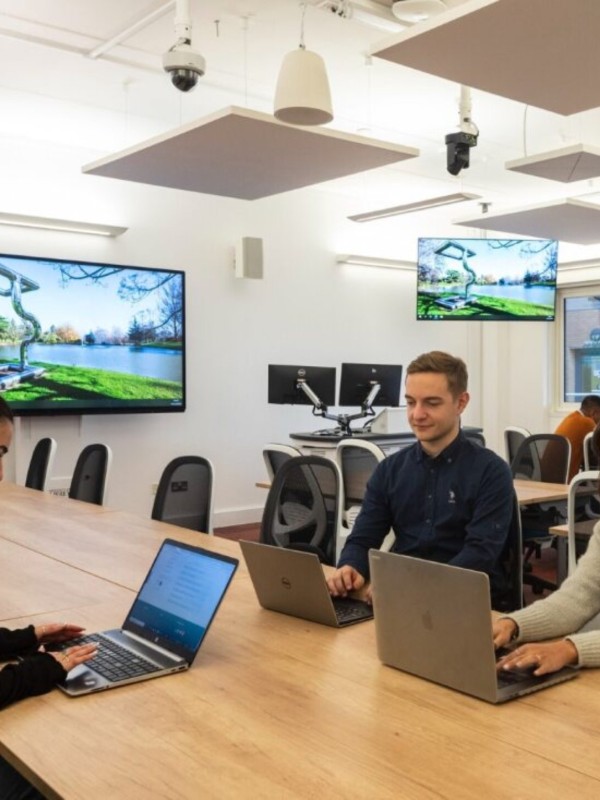
- Entrepreneurship & Innovation Management
MSc — 2025 entry Entrepreneurship & Innovation Management
Entrepreneurship and innovation management are essential for growth strategies in a world faced by technological disruption and expansion. This programme will prepare you for these challenges and opportunities – whether your future career is in a large organisation, an emerging-growth company, or as part of a start-up
Why choose
this course?
- As an entrepreneurship & innovation management student, you’ll be based in the Surrey Business School and be part of a vibrant community, focused on improving business practice and creating a sustainable and positive change.
- We combine an academic foundation with practical experience to reinforce your skills. This includes the MSc Corporate Challenge which supports digital marketing activity for SMEs as well as the product-market research project which supports start-ups with product development and builds on synergies with the SETSquared Partnership which is typically ranked as one of the top university business incubators worldwide by UBI Global
- You can also tailor your learning through a range of optional modules, including modules in the Faculty of Engineering and Physical Sciences, and a module to develop an original business idea with mentoring through SET-Squared Surrey. For the final project, students can choose either a consulting project with an existing company or a business plan based on original business idea while benefiting from mentoring to help you design your future career path.
- The School is renowned for its:
- World-class teaching and research
- Strong focus on entrepreneurship and enterprise
- Vibrant and diverse community
- Excellent career prospects.
Accreditation

What you will study
This course is designed to give you both practical and academic experience.
During your studies, you’ll explore the following topics:
- Entrepreneurship theory
- Innovation management
- Product-market research based on lean start-up
- Business modelling and scaling
- Business planning skills
- Digital marketing and analytics.
You’ll also gain practical experience in:
- Market research project working with start-ups
- Digital skills applied in modules
- Digital project with external stakeholders.
Your final project will apply your cumulative learning to develop a project related to your future ambitions. It may be either a business plan based on your own business idea, or a consulting project developed with a company stakeholder.
Professional recognition
MSc - Association to Advance Collegiate Schools of Business (AACSB)
Accredited by the Association to Advance Collegiate Schools of Business (AACSB).
Course highlights
Every year, we’re impressed by our students’ unbridled enthusiasm for learning by doing, an approach which reflects our practical approach to entrepreneurship and innovation.
Last year, the MSc cohort had many significant milestones and achievements. These included students who:
- Successfully designed and built websites in digital project development
- Worked with nine different start-up companies to develop product-market research in New Business Venturing module
- Participated in the MSc Corporate Challenge where 97 students and 19 teams supported 14 SMEs with their digital marketing strategies
- Completed several consultancy projects with local businesses and developed original business plans, some of which may lead to the launch of real businesses.
The structure of our programmes follows clear educational aims that are tailored to each programme. These are all outlined in the programme specifications which include further details such as the learning outcomes:
Modules
Modules listed are indicative, reflecting the information available at the time of publication. Modules are subject to teaching availability, student demand and/or class size caps.
The University operates a credit framework for all taught programmes based on a 15-credit tariff, meaning all modules are comprised of multiples of 15 credits, up to a maximum of 120 credits.
Course options
Year 1
Semester 1
Compulsory
In this module, students develop a holistic understanding of the theory and tools for Entrepreneurship which has a particular relevance in the context of the Digital Economy. This begins with a discussion of key concepts around the Entrepreneur, Opportunity Recognition and the Entrepreneurial Process. In turn, students review key elements for a start-up including resources, the founding team and business modelling. Finally, we look at scaling strategies in the Digital Economy including a range of different business models where start-ups create, deliver and capture value. The Digital Economy enables these innovative business models. For assessment, students research and apply Key Entrepreneurship Topics to case studies and then critically evaluate the scaling strategy for a designated emerging-growth companies in the Digital Economy using Entrepreneurship theory, Digital Economy theory and a business model framework.
View full module detailsThis module is designed for students to develop an understanding of the principles for developing a business idea into a viable business opportunity which is investment ready through authentic learning. This includes carrying out market research to validate a business idea by working with company stakeholders and then mapping out a business model for a scaling strategy to be investment ready. The module will enable students to understand theories related to Enterprise and Entrepreneurship and enable them to apply such theories through a group project to develop market research using Lean Start-up methodology by working with actual businesses. They will reflect further on their research to develop investment proposal which requires them to understand the investor perspective too.. Students will learn the theory and gain practical experience around key concepts for Entrepreneurship, Lean Start-up, Business Modelling and Entrepreneurial Business Planning.
View full module detailsIn this module, students develop an in-depth understanding of current trends for Digital Innovation and how they affect businesses in the Digital Economy today. This will involve reviewing a range of key Digital Innovation topics and evaluating their business context including technology, business models, stakeholders and ecosystem. In conjunction, students will develop understanding for methodology to evaluate Digital Innovation which they can apply to the different key topics for decision-making purposes. This relates to the programme by developing a deeper understanding of the Digital Economy and how Digital Innovation can be harnessed by businesses.
View full module detailsOptional
Expected prior/parallel learning: Basic knowledge of hardware systems and module EEE2047 (Object-Oriented Programming and C++) or equivalent knowledge of C++ or Java programming. Module purpose: Advances related to energy efficiency issues and cost reductions have resulted in the rapid growth and deployment of networked devices and sensing/actuation systems that connect the physical world with the cyber world. The resulting framework, known as the Internet of Things (IoT), incorporates several technologies, including wireless sensor networks, pervasive systems, ambient intelligence, context awareness, and distributed systems. The advanced IoT module is designed to provide a comprehensive understanding of how machine communications contribute to creating smart, artificial intelligence-driven environments focusing on networking and communication systems. The module provides an overview of the key concepts and enabling technologies for the Internet of Things. It encompasses a cross-layer approach, allowing students to explore the practical aspects of sensors, actuators, and mainly communication systems for IoT across physical, media access, and network layers. This includes security considerations, satellite IoT, positioning and tracking for industrial applications, IoT Platforms (Hardware, Software), protocols and standards (e.g. 6LowPAN, ZigBee, CoAp), semantic technologies, and data and information processing mechanisms. Â Also, the module seamlessly integrates cutting-edge machine learning techniques tailored for IoT applications, ensuring optimal performance and adaptability.
View full module detailsIt is an unfortunate fact that majority of global strategies fail in the stage of implementation. Many inner organisational and outer organisational factors affect the implementation of the global strategy. Thus, it is vital for management students to learn how to implement global strategies effectively. The module focuses on a range of topics such as process of strategy implementation, and influential factors on implementing the global strategy. Strategy-related subjects shape at least half of the contents in this programme.
View full module detailsInformation and communication technology is changing the way companies interact with consumers. Technological evolution continues apace and marketers are seeking to exploit it in new, creative ways. This module provides a comprehensive framework for understanding the contextual, strategic and operational issues involved in the application of digital transformation to marketing. The course will be of particular value to students planning careers in digital marketing and marketing consulting.
View full module detailsSemester 2
Compulsory
This Innovation Management module is a cornerstone in your business education. This module examines the strategic and tactical dimensions of innovation that a future leader considers when managing an organization or team. It combines established and contemporary conceptual frameworks with practical guidance for analyzing the challenges of leading an innovative organization. In this module, students will discuss the strategy, sources, processes, and implementation of innovation. This module particularly provides students with 1) a holistic understanding of the concept of innovation and its relevance to today’s firm competitiveness; 2) the capability to identify the links between the structures and processes which support specific models of innovation; 3) the capability to recognize the opportunities for, and constraints to innovation in specific business contexts and organizational settings; and 4) the capability to develop practical –oriented skills that are crucial to the management of innovation. In brief, students should come away with models and insights to succeed in each innovation management phase. Finally, the module is designed to provide deep theoretical and practical knowledge by applying theory in case studies and other assignments. The course consists of lectures, seminars, group assignments and an individual assignment.
View full module detailsStudents put theory into practice for digital skills by working in a group project with designated companies around a business challenge. The business challenge relates to key skills in the Digital Economy such as digital marketing. In the module, students develop an understanding of key topics related to the theory before applying the key skills. We bring in outside speakers from industry to create an authentic learning experience. For the project, students have two points of assessment to support the learning. Students develop other business skills such as problem-solving, project management, collaboration and resilience which they participate in the project. This supports programme objectives to develop an understanding of theory and practice related to Digital Economy as well as to develop skills relevant for Entrepreneurship.
View full module detailsThis module introduces students to the main principles of accounting and finance and demonstrates the importance of these to management decision making
View full module detailsThe Independent Applied Study is the major element of the MSc programme so should represent the application of learning across different modules. It allows students to concentrate on topics that are of particular interest to them which may be taught on the programme. It also gives the student an opportunity to work independently with supervision. The Study Report can take 2 different forms as follows: Business Plan - starts with an original business idea agreed with academic supervisor and developed by the student through a process of research into a clearly defined business plan. Consulting Project- starts with a consulting brief agreed with a company stakeholder and academic supervisor. It may be based on a problem or opportunity identified by the company stakeholder and involves a research-based solution to explore and develop the topic with milestones and objectives agreed for the delivery of the project.
View full module detailsOptional
In an increasingly globalised business and business environment, it is necessary for management students to learn how to strategies internationally viable global strategies. This module covers a variety of topics such as global strategic analysis, global strategy formulation, and global strategy execution. Strategy-related subjects shape at least half of the contents in this programme.
View full module detailsModule purpose: This course offers an introduction to image processing and computer vision for those interested in the science and technology of machine vision. It provides background and the theory for building artificial systems that manipulate videos and images and alter or analyse their information content. This is done by various computer algorithms that are discussed, implemented and demonstrated.
View full module detailsThis module introduces students to the concept and current practices in marketing analytics. Technology advances of the past decade have dramatically enhanced marketers' means of collecting and analysing data to measure the effectiveness of their marketing strategies. This module is designed to provide students with an overview of state-of-the-art marketing analytics practices that guide marketing executives in their strategic decisions. The module focuses on introducing students to key analytical techniques with an emphasis on interpreting results and generating strategic insights for marketing decision-making. The course will be of particular value to students planning careers in marketing and management consulting. The course is designed for students with a basic understanding of univariate and bivariate statistics. Addressing different learning styles, the following teaching methods are applied in this course: Pre-readings, Lectures, Class Exercises, Class Discussions, and Real World Cases/Industry Insights.
View full module detailsFor students who desire to pursue an original business idea, this module offers the opportunity to develop an independent business project where they can apply learning from the classroom and benefit from access to the resources of SETSquared Surrey, part of one of the top-ranked university business accelerators in the world; these resources includes mentoring and access to networking events to help develop the new business opportunity beyond a conceptual stage. The module builds on learning from other modules in the MSc programme including module MANM298 New Business Venturing and MANM104 Entrepreneurship & Digital Economy. To be accepted into the module, students must also demonstrate sufficient validation of their new business opportunity for criteria set in conjunction with SETSquared Surrey
View full module detailsOptional modules for Year 1 (full-time) - FHEQ Level 7
For further information regarding programme structure and module selection, please refer to the course catalogue.
Year 1
Semester 1
Compulsory
In this module, students develop a holistic understanding of the theory and tools for Entrepreneurship which has a particular relevance in the context of the Digital Economy. This begins with a discussion of key concepts around the Entrepreneur, Opportunity Recognition and the Entrepreneurial Process. In turn, students review key elements for a start-up including resources, the founding team and business modelling. Finally, we look at scaling strategies in the Digital Economy including a range of different business models where start-ups create, deliver and capture value. The Digital Economy enables these innovative business models. For assessment, students research and apply Key Entrepreneurship Topics to case studies and then critically evaluate the scaling strategy for a designated emerging-growth companies in the Digital Economy using Entrepreneurship theory, Digital Economy theory and a business model framework.
View full module detailsIn this module, students develop an in-depth understanding of current trends for Digital Innovation and how they affect businesses in the Digital Economy today. This will involve reviewing a range of key Digital Innovation topics and evaluating their business context including technology, business models, stakeholders and ecosystem. In conjunction, students will develop understanding for methodology to evaluate Digital Innovation which they can apply to the different key topics for decision-making purposes. This relates to the programme by developing a deeper understanding of the Digital Economy and how Digital Innovation can be harnessed by businesses.
View full module detailsSemester 2
Compulsory
This Innovation Management module is a cornerstone in your business education. This module examines the strategic and tactical dimensions of innovation that a future leader considers when managing an organization or team. It combines established and contemporary conceptual frameworks with practical guidance for analyzing the challenges of leading an innovative organization. In this module, students will discuss the strategy, sources, processes, and implementation of innovation. This module particularly provides students with 1) a holistic understanding of the concept of innovation and its relevance to today’s firm competitiveness; 2) the capability to identify the links between the structures and processes which support specific models of innovation; 3) the capability to recognize the opportunities for, and constraints to innovation in specific business contexts and organizational settings; and 4) the capability to develop practical –oriented skills that are crucial to the management of innovation. In brief, students should come away with models and insights to succeed in each innovation management phase. Finally, the module is designed to provide deep theoretical and practical knowledge by applying theory in case studies and other assignments. The course consists of lectures, seminars, group assignments and an individual assignment.
View full module detailsThis module introduces students to the main principles of accounting and finance and demonstrates the importance of these to management decision making
View full module detailsOptional modules for Year 1 (part-time) - FHEQ Level 7
For further information regarding programme structure and module selection, please refer to the course catalogue.
Year 2
Semester 1
Compulsory
This module is designed for students to develop an understanding of the principles for developing a business idea into a viable business opportunity which is investment ready through authentic learning. This includes carrying out market research to validate a business idea by working with company stakeholders and then mapping out a business model for a scaling strategy to be investment ready. The module will enable students to understand theories related to Enterprise and Entrepreneurship and enable them to apply such theories through a group project to develop market research using Lean Start-up methodology by working with actual businesses. They will reflect further on their research to develop investment proposal which requires them to understand the investor perspective too.. Students will learn the theory and gain practical experience around key concepts for Entrepreneurship, Lean Start-up, Business Modelling and Entrepreneurial Business Planning.
View full module detailsOptional
Expected prior/parallel learning: Basic knowledge of hardware systems and module EEE2047 (Object-Oriented Programming and C++) or equivalent knowledge of C++ or Java programming. Module purpose: Advances related to energy efficiency issues and cost reductions have resulted in the rapid growth and deployment of networked devices and sensing/actuation systems that connect the physical world with the cyber world. The resulting framework, known as the Internet of Things (IoT), incorporates several technologies, including wireless sensor networks, pervasive systems, ambient intelligence, context awareness, and distributed systems. The advanced IoT module is designed to provide a comprehensive understanding of how machine communications contribute to creating smart, artificial intelligence-driven environments focusing on networking and communication systems. The module provides an overview of the key concepts and enabling technologies for the Internet of Things. It encompasses a cross-layer approach, allowing students to explore the practical aspects of sensors, actuators, and mainly communication systems for IoT across physical, media access, and network layers. This includes security considerations, satellite IoT, positioning and tracking for industrial applications, IoT Platforms (Hardware, Software), protocols and standards (e.g. 6LowPAN, ZigBee, CoAp), semantic technologies, and data and information processing mechanisms. Â Also, the module seamlessly integrates cutting-edge machine learning techniques tailored for IoT applications, ensuring optimal performance and adaptability.
View full module detailsIt is an unfortunate fact that majority of global strategies fail in the stage of implementation. Many inner organisational and outer organisational factors affect the implementation of the global strategy. Thus, it is vital for management students to learn how to implement global strategies effectively. The module focuses on a range of topics such as process of strategy implementation, and influential factors on implementing the global strategy. Strategy-related subjects shape at least half of the contents in this programme.
View full module detailsInformation and communication technology is changing the way companies interact with consumers. Technological evolution continues apace and marketers are seeking to exploit it in new, creative ways. This module provides a comprehensive framework for understanding the contextual, strategic and operational issues involved in the application of digital transformation to marketing. The course will be of particular value to students planning careers in digital marketing and marketing consulting.
View full module detailsSemester 2
Compulsory
Students put theory into practice for digital skills by working in a group project with designated companies around a business challenge. The business challenge relates to key skills in the Digital Economy such as digital marketing. In the module, students develop an understanding of key topics related to the theory before applying the key skills. We bring in outside speakers from industry to create an authentic learning experience. For the project, students have two points of assessment to support the learning. Students develop other business skills such as problem-solving, project management, collaboration and resilience which they participate in the project. This supports programme objectives to develop an understanding of theory and practice related to Digital Economy as well as to develop skills relevant for Entrepreneurship.
View full module detailsThe Independent Applied Study is the major element of the MSc programme so should represent the application of learning across different modules. It allows students to concentrate on topics that are of particular interest to them which may be taught on the programme. It also gives the student an opportunity to work independently with supervision. The Study Report can take 2 different forms as follows: Business Plan - starts with an original business idea agreed with academic supervisor and developed by the student through a process of research into a clearly defined business plan. Consulting Project- starts with a consulting brief agreed with a company stakeholder and academic supervisor. It may be based on a problem or opportunity identified by the company stakeholder and involves a research-based solution to explore and develop the topic with milestones and objectives agreed for the delivery of the project.
View full module detailsOptional
In an increasingly globalised business and business environment, it is necessary for management students to learn how to strategies internationally viable global strategies. This module covers a variety of topics such as global strategic analysis, global strategy formulation, and global strategy execution. Strategy-related subjects shape at least half of the contents in this programme.
View full module detailsModule purpose: This course offers an introduction to image processing and computer vision for those interested in the science and technology of machine vision. It provides background and the theory for building artificial systems that manipulate videos and images and alter or analyse their information content. This is done by various computer algorithms that are discussed, implemented and demonstrated.
View full module detailsThis module introduces students to the concept and current practices in marketing analytics. Technology advances of the past decade have dramatically enhanced marketers' means of collecting and analysing data to measure the effectiveness of their marketing strategies. This module is designed to provide students with an overview of state-of-the-art marketing analytics practices that guide marketing executives in their strategic decisions. The module focuses on introducing students to key analytical techniques with an emphasis on interpreting results and generating strategic insights for marketing decision-making. The course will be of particular value to students planning careers in marketing and management consulting. The course is designed for students with a basic understanding of univariate and bivariate statistics. Addressing different learning styles, the following teaching methods are applied in this course: Pre-readings, Lectures, Class Exercises, Class Discussions, and Real World Cases/Industry Insights.
View full module detailsFor students who desire to pursue an original business idea, this module offers the opportunity to develop an independent business project where they can apply learning from the classroom and benefit from access to the resources of SETSquared Surrey, part of one of the top-ranked university business accelerators in the world; these resources includes mentoring and access to networking events to help develop the new business opportunity beyond a conceptual stage. The module builds on learning from other modules in the MSc programme including module MANM298 New Business Venturing and MANM104 Entrepreneurship & Digital Economy. To be accepted into the module, students must also demonstrate sufficient validation of their new business opportunity for criteria set in conjunction with SETSquared Surrey
View full module detailsOptional modules for Year 2 (part-time) - FHEQ Level 7
For further information regarding programme structure and module selection, please refer to the course catalogue.
General course information
Contact hours
Contact hours can vary across our modules. Full details of the contact hours for each module are available from the University of Surrey's module catalogue. See the modules section for more information.
Timetable
Course timetables are normally available one month before the start of the semester.
New students will receive their personalised timetable in Welcome Week, and in subsequent semesters, two weeks prior to the start of semester.
Please note that while we make every effort to ensure that timetables are as student-friendly as possible, scheduled teaching can take place on any day of the week (Monday – Friday). Wednesday afternoons are normally reserved for sports and cultural activities. Part-time classes are normally scheduled on one or two days per week, details of which can be obtained from Academic Administration.
Location
This course is based at Stag Hill campus. Stag Hill is the University's main campus and where the majority of our courses are taught.
We offer careers information, advice and guidance to all students whilst studying with us, which is extended to our alumni for three years after leaving the University.
90 per cent of our Surrey Business School postgraduate students go on to employment or further study (Graduate Outcomes 2024, HESA).
Some of our graduates have gone on to pursue a career in:
- Large companies such as Facebook and Amazon
- Scale-ups such as Alation and Thoughtspot
- Family-owned companies to expand strategies of growth
- Start-up companies that they have set up on their own, with opportunities to join the SETSquared Partnership.
UK qualifications
A minimum of a 2:2 UK honours degree or a recognised equivalent international qualification.
We may be able to take relevant work experience into consideration if you don't meet these requirements. If you have at least one year of relevant experience in a full-time graduate-level role (or a minimum of two years’ experience in a relevant graduate-level part-time role) please provide full details of your role and responsibilities in your personal statement and CV when you submit your application.
English language requirements
IELTS Academic: 6.5 overall including 6.0 in each category.
These are the English language qualifications and levels that we can accept.
If you do not currently meet the level required for your programme, we offer intensive pre-sessional English language courses, designed to take you to the level of English ability and skill required for your studies here.


International Pre-Masters
Prepare for postgraduate study and boost your career prospects. This is an intensive programme of academic subjects, study skills and English language preparation designed to help you succeed.
Recognition of prior learning
We recognise that many students enter their course with valuable knowledge and skills developed through a range of ways.
If this applies to you, the recognition of prior learning process may mean you can join a course without the formal entry requirements, or at a point appropriate to your previous learning and experience.
There are restrictions for some courses and fees may be payable for certain claims. Please contact the Admissions team with any queries.
Scholarships and bursaries
Discover what scholarships and bursaries are available to support your studies.
Fees per year
Explore UKCISA’s website for more information if you are unsure whether you are a UK or overseas student. View the list of fees for all postgraduate courses.
September 2025 - Full-time - 1 year
- UK
- £15,200
- Overseas
- £24,900
September 2025 - Part-time - 2 years
- UK
- £7,600
- Overseas
- £12,500
- If you are on the two-year part-time masters programme, the annual fee is payable in Year 1 and Year 2 of the programme
- These fees apply to students commencing study in the academic year 2025-26 only. Fees for new starters are reviewed annually.
Payment schedule
- Students with Tuition Fee Loan: the Student Loans Company pay fees in line with their schedule (students on an unstructured self-paced part-time course are not eligible for a Tuition Fee Loan).
- Students without a Tuition Fee Loan: pay their fees either in full at the beginning of the programme or in two instalments as follows:
- 50% payable 10 days after the invoice date (expected to be October/November of each academic year)
- 50% in January of the same academic year.
- Students on part-time programmes where fees are paid on a modular basis: cannot pay fees by instalment.
- Sponsored students: must provide us with valid sponsorship information that covers the period of study.
The exact date(s) will be on invoices.
Funding
You may be able to borrow money to help pay your tuition fees and support you with your living costs. Find out more about postgraduate student finance.
Apply online
To apply online first select the course you'd like to apply for then log in.
Select your course
Choose the course option you wish to apply for.
Sign in
Create an account and sign into our application portal.
Please note that we may have to close applications before the stated deadline if we receive a high volume of suitable applications. We advise you to submit your application as soon as it is ready.
ApplyPlease note that we may have to close applications before the stated deadline if we receive a high volume of suitable applications. We advise you to submit your application as soon as it is ready.
ApplyAdmissions information
Once you apply, you can expect to hear back from us within 14 days. This might be with a decision on your application or with a request for further information.
Our code of practice for postgraduate admissions policy explains how the Admissions team considers applications and admits students. Read our postgraduate applicant guidance for more information on applying.
About the University of Surrey
Need more information?
Contact our Admissions team or talk to a current University of Surrey student online.
Terms and conditions
When you accept an offer to study at the University of Surrey, you are agreeing to follow our policies and procedures, student regulations, and terms and conditions.
We provide these terms and conditions in two stages:
- First when we make an offer.
- Second when students accept their offer and register to study with us (registration terms and conditions will vary depending on your course and academic year).
View our generic registration terms and conditions (PDF) for the 2024/25 academic year, as a guide on what to expect.
Disclaimer
This online prospectus has been published in advance of the academic year to which it applies.
Whilst we have done everything possible to ensure this information is accurate, some changes may happen between publishing and the start of the course.
It is important to check this website for any updates before you apply for a course with us. Read our full disclaimer.








